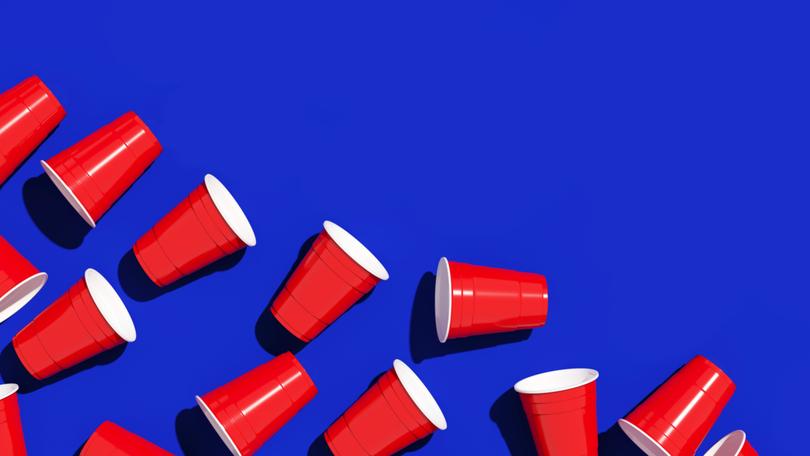JENI O’DOWD: Have our kids become smarter than us and stopped binge drinking as teenagers?
Navigating the murky domain of teenagers and drinking has long posed a challenge for parents, especially considering alcohol is an intrinsic part of Aussie culture. But are our kids becoming smarter than us?

Our Google Home was discovered in the letterbox and the number plates of our cars mysteriously vanished. My prized ceramic flowers pulled a disappearing act, and a few adventurous pot plants decided to take a dip in the pool.
So, when we decided to brave another birthday bash hosted by our eldest teenager, our friends and family were understandably horrified.
Yet, against all odds, this time around the celebration for her 17th birthday unfolded with surprising ease and order. Perhaps it was the security we hired or the fact the same kids were a year older.
Sign up to The Nightly's newsletters.
Get the first look at the digital newspaper, curated daily stories and breaking headlines delivered to your inbox.
By continuing you agree to our Terms and Privacy Policy.Navigating the murky domain of teenagers and drinking has long posed a challenge for parents, especially considering the fact alcohol is an intrinsic part of the Aussie culture.
But are our kids becoming smarter than us? Recent research shows that more and more teens are abstaining from alcohol; with the average age of first having an alcoholic drink increasing from 14.7 years in 2001 to 16.1 years in 2022-23.
And, no, our teenagers are not turning to drugs instead of alcohol. Rates of cannabis and meth/amphetamine use have also declined in the past decade.
The laws around hosting a party for teenagers — those 18 years and under — are different between the States, but in NSW, it is an offence to buy or supply alcohol to anyone under 18.
When you are the supervising adult, you must uphold responsible service of alcohol practices to avoid anyone getting drunk. You need to provide supervision and let other parents know if alcohol will be present. Oh, and you need to prevent any smuggling of alcohol (good luck with that one).
The NSW Liquor Act does say, however, that a parent or guardian may supply alcohol to a minor in the family home, but they must be supervised.
Interestingly, minors are also allowed to drink alcohol in a public place if they are supervised, or “have a reasonable excuse for possessing or consuming the alcohol”.
One of Australia’s foremost alcohol experts Dr Michael Livingston, an associate professor with Curtin University, told The Nightly teen drinking had declined over the past decade and that trend was continuing, as evidenced in the recently released 2022-2023 National Drug Household Survey.
He said risky drinking for 14-17-year-olds was at 31 per cent in 2001 and had fallen to just 5.5 per cent in that survey, and over the same period, complete abstention from alcohol had increased from 32 per cent to 70 per cent in that age group. Trends were pretty similar for boys and girls.
If you don’t give your kids a safe space to hang out with their friends, they’ll find one on their own.
“The evidence suggests teenage drinking is still declining, although it’s hard to think that it could fall much lower,” he said.
Dr Livingston says across all the research work he and his colleagues have done, they have concluded there’s no single or simple reason for this.
“The overarching story seems to be a broad cultural shift in younger generations attitudes to risk and uncertainty,” he said.
“Alcohol is seen as risky and unpredictable, and young people are increasingly cautious across several facets of their lives: worried about unstable futures, concerned with health and wellbeing, aware of the risks of alcohol and drugs and just generally less likely to engage in impulsive behaviour.
“There’s definitely some evidence that reductions in face-to-face socialising among kids have been important too, especially unsupervised.
“So it’s a complicated story and one that likely reflects broader shifts among what it means to be a teenager these days.”
The influence of social media with an emphasis on exercising and eating well must also play a part. And, with the prevalence of phone videos and cameras, who wants the world to witness an embarrassing and messy alcohol-induced incident?
We decided to throw another party for our teenager for a couple of reasons. Firstly, we believed that some uninvited boys caused trouble at the first one. That’s why we thought it’d be a good idea to have security for the second bash. Looking back, we kicked ourselves for not doing it the first time around.
And if you don’t give your kids a safe space to hang out with their friends, they’ll find one on their own. And chances are, they won’t tell you where they’re meeting up. You might end up finding out they’re hanging out at the local park or on a beach, where anyone can show up. Believe me, alcohol, the dark and teenagers do not mix well.
And if you allow moderate alcohol consumption in your own home, you take away the allure of it being taboo and restricted. Soon enough, they come to understand that alcohol isn’t as glamorous as all those television advertisements make it out to be.
So how did our second teenage party end up? As they were leaving, many of the kids thanked us for hosting. Our daughter’s friends helped clean up before they left, leaving no trace of the retro disco madness that unfolded just a few hours before.
It was a testament to the camaraderie shared among teenagers. While you often hear negative stories in the media, their sense of responsibility and respect for our home left a lasting impression, reminding us that stereotypes rarely capture the full picture.
